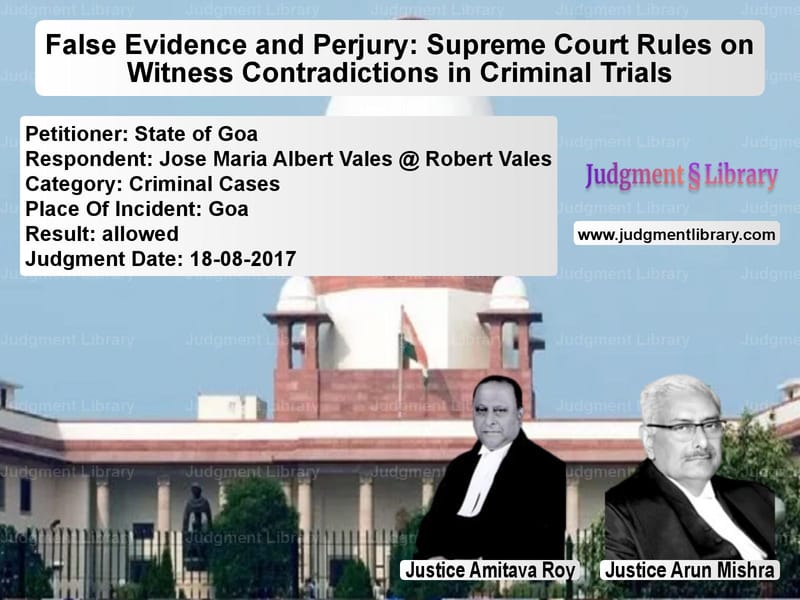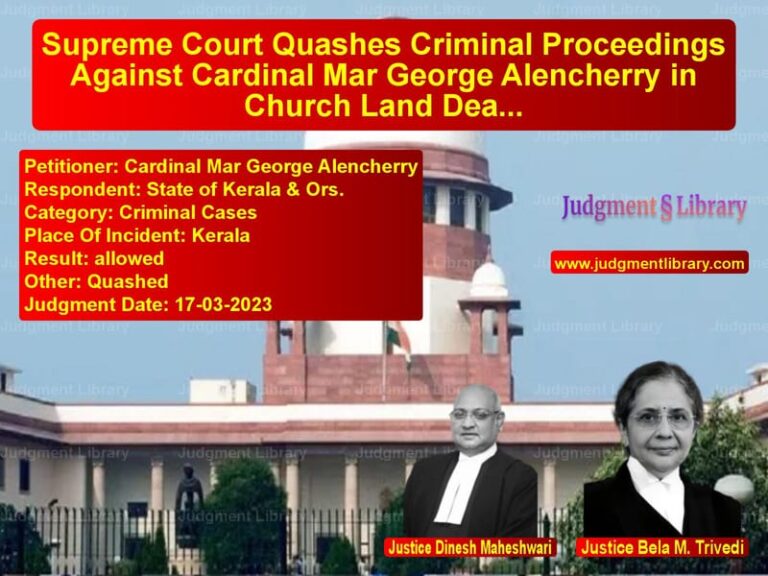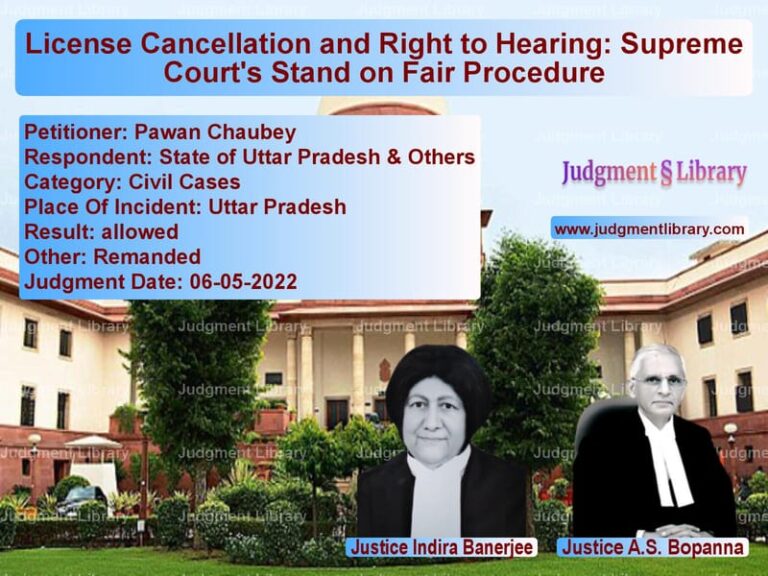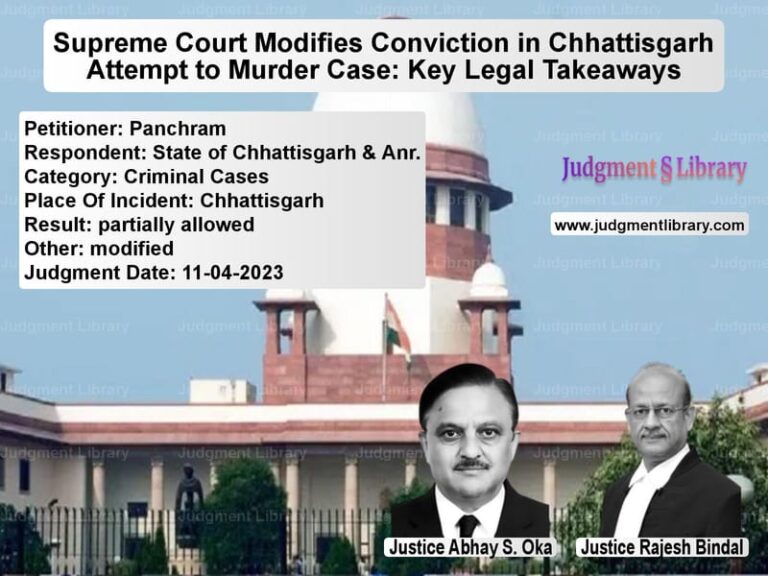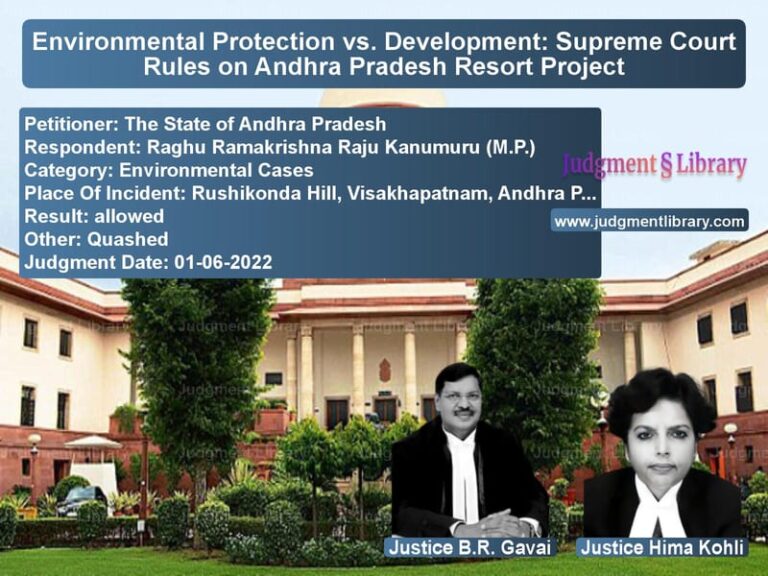False Evidence and Perjury: Supreme Court Rules on Witness Contradictions in Criminal Trials
The case of State of Goa vs. Jose Maria Albert Vales @ Robert Vales pertains to the legal implications of providing false evidence during a criminal trial. The Supreme Court was required to determine whether the High Court erred in quashing the charge framed under Section 193 of the Indian Penal Code (IPC) against the respondent for perjury.
Background of the Case
The respondent, Jose Maria Albert Vales, was a prosecution witness in Sessions Case No. 18/2000, a trial concerning offenses under Sections 120B and 302 of the IPC along with Section 25 of the Arms Act. Before testifying at trial, he had given a statement under Section 164 of the Code of Criminal Procedure (Cr.P.C.) before a Magistrate. However, when he appeared before the Sessions Court, he contradicted his previous statement.
The Sessions Court found that the respondent had deliberately made false statements in court, thereby warranting prosecution under Section 193 IPC (punishment for false evidence). The Trial Court proceeded with the case based on a complaint under Section 340 Cr.P.C. The High Court, however, quashed the charge, stating that the Trial Magistrate had not adhered to the procedure under Section 244 of the Cr.P.C. The High Court directed the prosecution to present all its evidence before deciding whether a charge should be framed.
Legal Issues
The Supreme Court had to address the following legal issues:
- Whether the High Court erred in holding that the case should be treated as one instituted otherwise than on a police report, requiring strict compliance with Section 244 Cr.P.C.
- Whether the case should have been handled as if it was instituted on a police report, under Sections 238 to 243 Cr.P.C.
- Whether the Trial Magistrate correctly framed charges without examining all prosecution witnesses.
Arguments by the Appellant (State of Goa)
The State of Goa, through its counsel, argued:
- The High Court was incorrect in directing the Trial Magistrate to follow the procedure under Section 244 Cr.P.C., as the case should have been treated as one instituted on a police report under Section 343 Cr.P.C.
- There was sufficient evidence to frame charges against the respondent under Section 193 IPC.
- The High Court’s decision placed an unnecessary procedural burden, delaying justice in cases of perjury.
Arguments by the Respondent (Jose Maria Albert Vales)
The respondent’s counsel countered:
- The High Court correctly ruled that strict adherence to Section 244 Cr.P.C. was necessary since the case was instituted on a complaint rather than a police report.
- The Trial Magistrate had prematurely framed charges without examining all prosecution witnesses.
- Since the alleged false statement was a contradiction of an earlier statement under Section 164 Cr.P.C., no perjury charges should have been framed without a thorough examination of all evidence.
Supreme Court Judgment
The Supreme Court ruled in favor of the appellant (State of Goa), setting aside the High Court’s decision. The key observations made by the Court were:
- Under Section 343(1) Cr.P.C., complaints made under Section 340 Cr.P.C. should be treated as cases instituted on police reports, requiring adherence to the procedure under Sections 238 to 243 Cr.P.C.
- The High Court’s order misapplied procedural law by insisting on strict compliance with Section 244 Cr.P.C.
- Since the complaint was filed by the Sessions Court, the Trial Magistrate was justified in framing charges under Section 193 IPC without requiring additional prosecution witnesses.
- The High Court’s interference was unwarranted and resulted in an incorrect interpretation of procedural requirements.
Observations of the Supreme Court
The Court stated:
“The findings of the High Court, in our opinion, are unsustainable, as they impose a procedural requirement inconsistent with the provisions of Section 343(1) Cr.P.C. A complaint under Section 340 Cr.P.C. is to be treated as a case instituted on a police report and proceeded with accordingly.”
The Court further ruled:
“The Trial Magistrate’s order framing charges under Section 193 IPC was justified. The High Court’s quashing of the charge and remanding the case for further prosecution evidence was legally incorrect.”
Conclusion
The Supreme Court’s ruling emphasizes the importance of adhering to the correct procedural framework in cases of perjury and false evidence. The judgment clarifies:
- Complaints under Section 340 Cr.P.C. should be treated as cases instituted on police reports and handled accordingly under Sections 238 to 243 Cr.P.C.
- Charges for perjury can be framed based on prima facie evidence without requiring exhaustive prosecution evidence.
- High Courts must avoid unnecessary procedural interventions that delay the prosecution of offenses affecting the administration of justice.
This ruling serves as a precedent in ensuring that false evidence cases are dealt with efficiently, reinforcing the accountability of witnesses in criminal trials.
Don’t miss out on the full details! Download the complete judgment in PDF format below and gain valuable insights instantly!
Download Judgment: State of Goa vs Jose Maria Albert Va Supreme Court of India Judgment Dated 18-08-2017.pdf
Direct Downlaod Judgment: Direct downlaod this Judgment
See all petitions in Criminal Defamation
See all petitions in Contempt Of Court cases
See all petitions in Fraud and Forgery
See all petitions in Judgment by Amitava Roy
See all petitions in Judgment by Arun Mishra
See all petitions in allowed
See all petitions in supreme court of India judgments August 2017
See all petitions in 2017 judgments
See all posts in Criminal Cases Category
See all allowed petitions in Criminal Cases Category
See all Dismissed petitions in Criminal Cases Category
See all partially allowed petitions in Criminal Cases Category

